Qatar Vision 2030 is an ambitious strategic plan developed by the State of Qatar to guide long-term national development, aiming to achieve a balance between modernization and preserving traditional values.
This vision sets the general framework upon which the country's development policies and plans are based until 2030.
It represents a clear roadmap for building a prosperous and sustainable future, as Qatar is always committed to continuous development and aims for continuous progress in all aspects of the country.
Let's learn more about the ambitions outlined in Qatar National Vision 2030.
Qatar Vision 2030
Qatar 2030 Vision is a comprehensive development vision announced by the Qatari government in 2008.
It aims to transform Qatar into an advanced country capable of achieving sustainable development and ensuring continued prosperity for its people into the future.
Qatar National Vision 2030 addresses the most important principles, values, pillars, goals, and challenges facing Qatar from 2008 to 2030.
The Emir and Prime Minister made key statements regarding Qatar's future up to 2030.
This is what we will address in this article. We will provide all the information about Qatar Vision 2030 and will also address the statements of the Emir and Prime Minister.
What Are the Goals of Qatar Vision 2030?
- Achieving sustainable development in all sectors.
- Diversifying sources of income and reducing dependence on oil and gas.
- Preparing national cadres to lead the economy and society.
- Supporting innovation and technology in all fields.
- Achieving social justice and equality.
- Enhancing Qatar's global standing as a stable and prosperous country.
What Are the Main Points of Vision 2030?
The Qatar National Vision 2030 goals represent a set of strategic objectives that the country seeks to achieve in order to create a prosperous, sustainable, and diverse future for future generations.
These goals are centered on four main pillars: people, economy, society, and environment.
We will explain each of the Qatar Vision 2030 goals in detail.
Pillars of Qatar Vision 2030
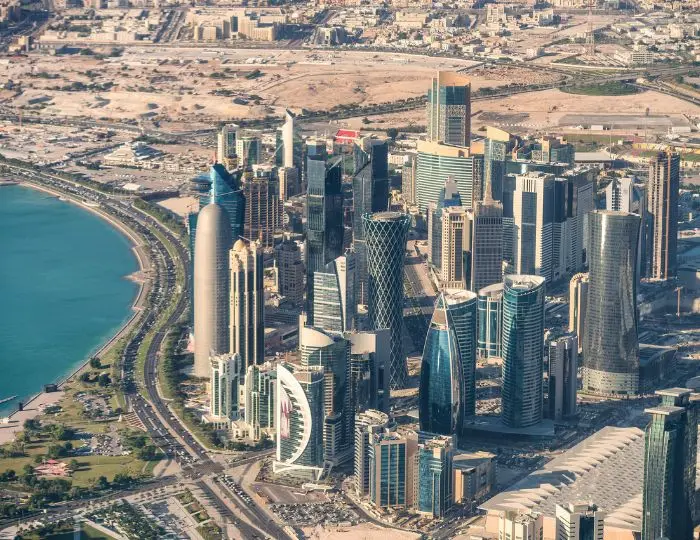
Economic Development Goals
- Promoting long-term financial and economic stability.
- Diversifying the economy and reducing dependence on oil and gas.
- Encouraging local investment and developing a competitive economy capable of meeting the country's needs.
- Empowering the private sector and increasing its role in economic growth.
- Developing modern infrastructure and advanced transportation networks.
Environmental Development Goals
- Sustainably use natural resources.
- Protect the environment from pollution and preserve biodiversity.
- Support renewable energy projects and reduce carbon emissions.
- Raise environmental awareness among community members.
- Achieving a balance between economic growth and environmental conservation.
- Managing the balance between environmental, social, economic, and human objectives.
Human Development Goals
- Develop a high-quality education system that provides opportunities for all citizens to develop their skills and knowledge.
- Build a qualified national workforce capable of competing locally and globally.
- Improve the quality and availability of healthcare for all.
- Support scientific research and innovation to build an advanced knowledge economy.
- Develop human resources by developing education and providing training opportunities.
Social Development Goals
- Preserving religious and cultural values and Qatari national identity.
- Building a cohesive and interconnected society based on justice and equality, providing security and stability at all times.
- Empowering women and youth to fully participate in public life.
- Achieving social justice and equal opportunities for all.
- Strengthening the role of civil society and volunteer organizations.
Principles and Values That Qatar National Vision 2030 Focuses On
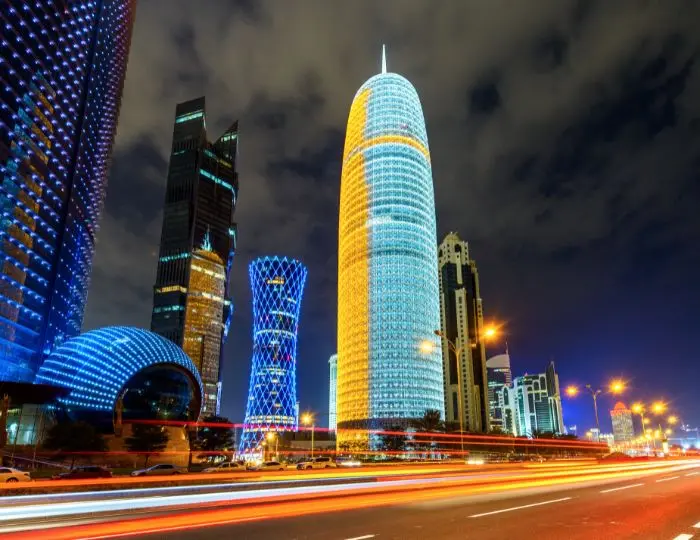
National and Cultural Identity
- Preserving Islamic traditions and authentic Arab values.
- Promoting the Arabic language and local culture in education and media.
- Supporting Qatari heritage as part of the national character.
- Achieving a balance between modernity and tradition.
Justice and Equality
- Equal opportunities for all citizens, men and women.
- Social justice is in the equitable distribution of wealth and services.
- Combating discrimination based on gender, origin, or social status.
- Empowering the less fortunate in society.
Independence and Sovereignty
- Maintaining the independence of national decision-making in all areas.
- Promoting internal security and stability.
- Building international relations based on respect and shared interests.
Education and Knowledge
- Investing in the Qatari citizen as the most valuable national resource.
- Building a knowledge-based society based on science and innovation.
Sustainability
- Sustainable development that balances the present and the future.
- Optimal utilization of natural resources and avoiding their waste.
- Environmental responsibility among individuals and institutions.
Community Participation and Responsibility
- Active citizenship and participation in decision-making.
- Encouraging volunteer work and the role of civil society.
- Accountability and transparency in government performance.
Achievements So Far of Qatar National Vision 2030
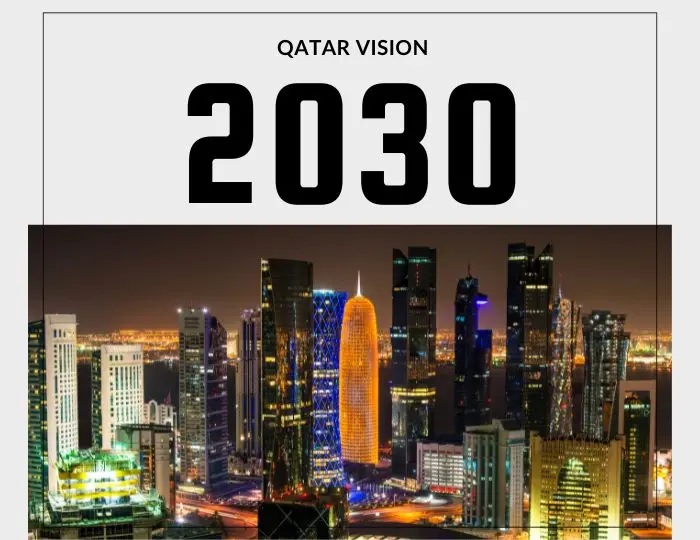
In the Economy
- Establishing free zones to attract investment.
- Expanding Hamad International Airport to make it one of the best in the world.
- Developing Hamad Port as a major logistics hub in the Gulf.
- Enhancing Qatar's global credit rating is one of the most important positive aspects of Qatar National Vision 2030.
Supporting Sustainability
- Long-term environmental projects to achieve the goals of the Qatar 2030 Vision.
- Supporting the green economy and the rational use of natural resources.
- Integrating sustainability principles into education, labor, and infrastructure policies.
In Health
- Building modern hospitals such as Sidra Medicine and Hamad Medical Center.
- Launching health insurance programs by Vision 2030.
- Improving the quality of healthcare services for citizens and residents.
In the Environment
- Adopting solar energy projects.
- Developing public transportation systems, such as the Doha Metro.
- Organizing the 2022 World Cup with the first carbon-neutral stadiums.
- The 2022 World Cup also contributed to stimulating tourism in Qatar and presenting a positive image of Qatar to the world.
In Education
- Developing the public and private education system.
- The establishment of Education City, which includes branches of international universities such as Georgetown and Carnegie Mellon.
- Supporting scientific research is a key focus of Qatar Vision 2030, through Qatar Foundation and research centers.
Challenges Facing Qatar Vision 2030
Reliance on the oil and gas sector
This is one of the biggest challenges facing Qatar National Vision 2030. Despite efforts to diversify the economy, Qatar remains heavily dependent on energy revenues.
Preserving cultural identity
Now, with global openness and a highly diverse population, the challenge of preserving Qatari, Arab, and Islamic values increases.
Environmental development
Due to rising water and energy consumption, increased waste, and climate challenges.
Financial sustainability
Financing mega-projects requires long-term economic stability. Therefore, Qatar National Vision 2030 is focused on developing alternative and sustainable financing strategies.
Technology and digital transformation
Digital, educational, and industrial infrastructure must be continuously updated.
Regional and global stability
Political or economic tensions in the region can impact development plans. Qatar National Vision 2030 aims to ensure policy flexibility and preparedness for future crises.
How Taqat Aligns With Qatar National Vision 2030
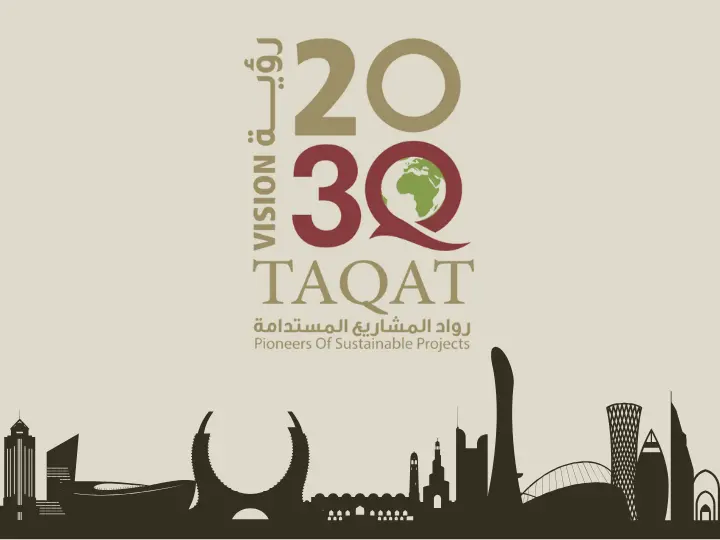
Since the beginning of its journey in 2014, Taqat has consistently strived to develop projects and programs aimed at sustainable, social, and economic development.
Therefore, it is certainly one of Qatar's strengths toward Vision 2030.
Taqat's projects align with the goals of Qatar National Vision 2030.
Indeed, Taqat has independent branches dedicated to developing technology, the environment, administration, finance, human resources, and other projects, programs, and companies.
A closer examination of these projects reveals that they all align with the objectives of Qatar Vision 2030.
So, if you are a business owner and want to develop your projects in a manner consistent with the Qatar 2030 Vision, Taqat is your ideal destination for sustainable technological development.
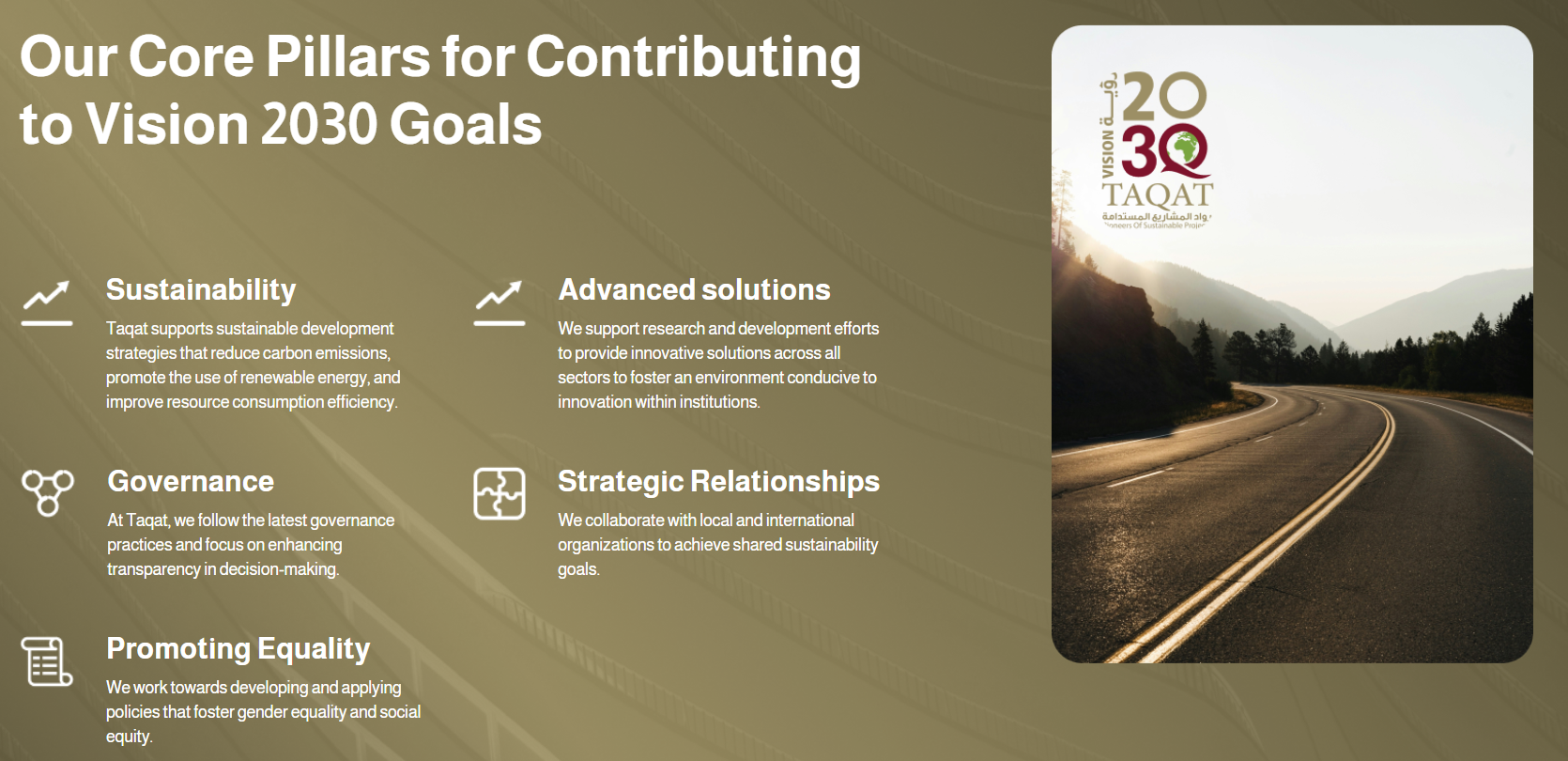
Contact Us | Know More about Us
What Makes Qatar Vision 2030 Unique?
- Focusing on people as the primary focus.
- Combining tradition and modernity.
- Inclusivity across all sectors of the state.
- Regional and global ambition.
Conclusion
Qatar National Vision 2030 is not just a plan on paper; it is an ambitious national project that is becoming a reality day by day.
The vision has positioned Qatar as a leader in the Middle East and strengthened its ability to face global challenges with confidence and steadfastness.
Under Qatar Vision 2030, Qatar is expected to become one of the most stable and prosperous countries in the world by 2030, thanks to its people, its leadership, and its balanced strategy that combines development with tradition.

Taqat's role is evident here as one of the leading companies in various fields, such as sustainable development, logistics and transport, process manufacturing, discrete manufacturing, engineering and technical services, support and facility services, social and nonprofit, entertainment, utilities and resources, automotive, building and construction, education, and retail.
This makes it a key supporter of Qatar National Vision 2030.